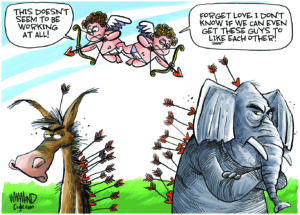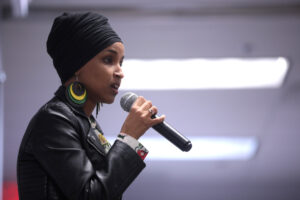Marie Cocco: Women Rock the Vote
The media have largely ignored the role women played in swinging the election, as well as the unprecedented power they'll now wield in Congress.WASHINGTON — The headline is brief: Democrats win. The subtext is powerful: Women rule!
And not just Nancy Pelosi.
Now that the media have breathlessly declared that Pelosi’s anticipated ascension to speaker of the House is a historic first, we’re back to a lineup of male talking heads talking about how they may, or may not, get us out of the mess they got us into in Iraq. There is just one problem with this business-as-almost-usual story line: It ignores the decisive role that women voters played in the midterm election. And it discounts the power that women lawmakers — besides Pelosi — will wield in the newly constituted Congress.
If it weren’t for women voters, the Senate would still be Republican red. In four of the six Senate races that Democrats won to gain control of the chamber, women’s votes decided the outcome. This was especially true in the pivotal Virginia contest, where Democrat Jim Webb won 55 percent of women’s votes, but only 45 percent of men’s. Democratic Senate pickups in Rhode Island, Missouri and Montana also were possible only because of the gender gap. “It couldn’t be much clearer,” Eleanor Smeal, president of the political action group Feminist Majority Foundation, said in an interview. “If only men voted, we would have a Republican Senate.”
Parsing the women’s vote in individual House races is harder, but network exit polls showed that Democrats made gains among all groups of women voters — married and unmarried, white and nonwhite. There was an eye-popping 18-point shift of Hispanic women to the Democratic column, compared with the 2004 election, according to an analysis by pollster Peter D. Hart for the fundraising group Emily’s List. Democratic support among women 18 to 29 surged by 14 points, and support for Democratic candidates was up 12 points among women who identify themselves as independents.
So the Senate will reconvene with two more women — Amy Klobuchar of Minnesota and Claire McCaskill of Missouri. Because some Republican women lawmakers were defeated in House races, the net gain of seats among women in the House isn’t large — only five, pending the outcome of a few recounts.
But numbers don’t tell the whole story. A new generation of power brokers will. For the first time ever, women won’t just have a seat at the table. They’ll decide what’s in the agenda books that get placed on it — and run the meetings.
Pelosi’s climb to the speaker’s chair doesn’t only mean she’ll be the first woman to hold that constitutional post, which puts her second in the line of presidential succession. She will be the most powerful woman in American history. The House speaker decides who chairs committees, what legislation can move to the floor and what form it will take when it gets there.
Backing Pelosi up will be another woman whose role is historic: Rep. Louise Slaughter of New York is in line to chair the crucial Rules Committee, where legislation and the terms of debate are set before bills go to the floor.
Any voter who said “corruption” was pivotal in the election has at last found a champion: Slaughter is a bulldog on ethics. Even before the “culture of corruption” made it into the political lexicon, she used her position on the rules panel to compile a detailed — and devastating — report on how powerful lobbyists held sway over key bills and even convinced Republicans to alter the legislative process.
Other Democratic women who are likely to chair committees are Nydia Velazquez of New York on small business and Juanita Millender-McDonald of California on House administration.
It is, admittedly, awfully annoying to see one old and enduring stereotype at work. Now that Washington is such an unholy mess, women have been called in to clean it up. The greater joy is knowing that the emergence of strong, smart women will help the public adjust to seeing women in power. Ramona Oliver of Emily’s List, which supports Democratic women candidates who back abortion rights, said that her organization is about to send a celebratory mailing to its members: A photo from last year’s State of the Union address showing President Bush, Vice President Cheney and House Speaker J. Dennis Hastert standing together before the flags that traditionally drape the House speaker’s podium. The message? “You’ve changed this picture forever!”
Let’s hope so.
Marie Cocco’s e-mail address is [email protected].
Your support matters…Independent journalism is under threat and overshadowed by heavily funded mainstream media.
You can help level the playing field. Become a member.
Your tax-deductible contribution keeps us digging beneath the headlines to give you thought-provoking, investigative reporting and analysis that unearths what's really happening- without compromise.
Give today to support our courageous, independent journalists.






You need to be a supporter to comment.
There are currently no responses to this article.
Be the first to respond.